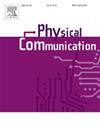SCMA-Q-learning with overload control for random access in LEO satellite mMTC networks
IF 2
4区 计算机科学
Q3 ENGINEERING, ELECTRICAL & ELECTRONIC
引用次数: 0
Abstract
With the continuous advancement of 5G and beyond wireless networks, the exponential increase in Machine-Type Communication (MTC) devices presents substantial challenges, particularly in deal with Random Access Channel (RACH) congestion in massive MTC (mMTC) networks. Low Earth Orbit (LEO) satellite communication networks are increasingly valued for their global coverage and low-latency benefits. This paper deals with the RACH congestion problem in LEO satellite networks by proposing an innovative method that combines Sparse Code Multiple Access (SCMA), Q-learning, and Access Class Barring (ACB) technology. The proposed approach allows MTC devices to dynamically optimize resource allocation by selecting the most appropriate codebooks and time-slot groups in response to environmental changes. Additionally, ACB is employed to control system overload by adjusting the access probability of devices based on network conditions. Simulation results show that the proposed SCMA-QL-ACB method significantly improves system throughput and reduces collisions compared to existing techniques.
求助全文
约1分钟内获得全文
求助全文
来源期刊

Physical Communication
ENGINEERING, ELECTRICAL & ELECTRONICTELECO-TELECOMMUNICATIONS
CiteScore
5.00
自引率
9.10%
发文量
212
审稿时长
55 days
期刊介绍:
PHYCOM: Physical Communication is an international and archival journal providing complete coverage of all topics of interest to those involved in all aspects of physical layer communications. Theoretical research contributions presenting new techniques, concepts or analyses, applied contributions reporting on experiences and experiments, and tutorials are published.
Topics of interest include but are not limited to:
Physical layer issues of Wireless Local Area Networks, WiMAX, Wireless Mesh Networks, Sensor and Ad Hoc Networks, PCS Systems; Radio access protocols and algorithms for the physical layer; Spread Spectrum Communications; Channel Modeling; Detection and Estimation; Modulation and Coding; Multiplexing and Carrier Techniques; Broadband Wireless Communications; Wireless Personal Communications; Multi-user Detection; Signal Separation and Interference rejection: Multimedia Communications over Wireless; DSP Applications to Wireless Systems; Experimental and Prototype Results; Multiple Access Techniques; Space-time Processing; Synchronization Techniques; Error Control Techniques; Cryptography; Software Radios; Tracking; Resource Allocation and Inference Management; Multi-rate and Multi-carrier Communications; Cross layer Design and Optimization; Propagation and Channel Characterization; OFDM Systems; MIMO Systems; Ultra-Wideband Communications; Cognitive Radio System Architectures; Platforms and Hardware Implementations for the Support of Cognitive, Radio Systems; Cognitive Radio Resource Management and Dynamic Spectrum Sharing.
 求助内容:
求助内容: 应助结果提醒方式:
应助结果提醒方式:


